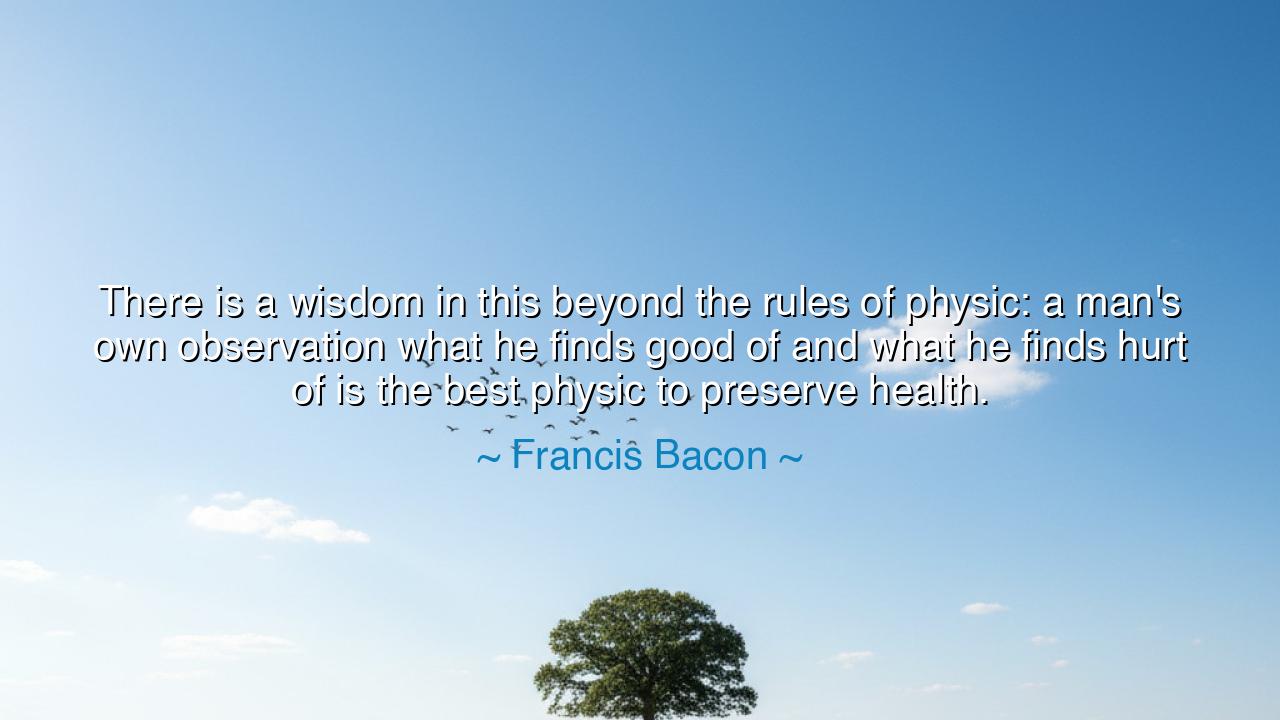
There is a wisdom in this beyond the rules of physic: a man's own
There is a wisdom in this beyond the rules of physic: a man's own observation what he finds good of and what he finds hurt of is the best physic to preserve health.






“There is a wisdom in this beyond the rules of physic: a man’s own observation what he finds good of and what he finds hurt of is the best physic to preserve health.” — Francis Bacon
Hear now the words of Francis Bacon, the great philosopher of reason, who sought to unite the realms of knowledge and nature. In this saying lies not only the wisdom of the scholar, but the eternal counsel of life itself. He speaks of wisdom beyond physic — that is, wisdom beyond the written laws of medicine and the knowledge of learned men. Bacon reminds us that no rule, no doctrine, no book can know a soul’s vessel better than the man himself. For the truest physician dwells within, whispering through observation, through the quiet noticing of what brings us strength and what brings us harm. Thus, he declares that self-knowledge is the highest art of healing.
In Bacon’s time, the world stood at the dawn of science. The rules of physic, or the laws of medicine, were written in rigid ink — prescribing the same draught for every ailment, the same rule for every man. But Bacon, prophet of empiricism, saw a greater truth: that observation — personal, mindful, and intimate — is more powerful than blind obedience to authority. He knew that every body, every mind, every spirit, is its own constellation, unique and unrepeatable. What nourishes one may poison another; what soothes the heart of one may burden the soul of another. Thus, to know oneself is to hold the key to health and longevity.
Consider the tale of Hippocrates, father of ancient medicine. Though he laid down the laws of healing, even he taught his disciples that the greatest tool of the physician was not the potion, but the patient’s own awareness. When a man ate and slept according to his nature — when he heeded the quiet signs of his body — he required no cure, for he was already balanced. Hippocrates called this harmony eucrasia — the perfect balance of the elements within. Bacon, centuries later, breathed new life into this same truth, cloaked in the reason of his age: that the most sacred medicine is the one found through listening to the body’s own wisdom.
In our own time, mankind has wandered far from this counsel. We seek healing in pills and in promises, in devices and decrees, forgetting the still voice within that says: “This nourishes me. This harms me.” We turn to physicians and strangers to tell us what to eat, how to rest, what to feel — yet few pause to watch how their own heart responds. But Bacon’s words are a clarion call to return to observation — to the art of being present with ourselves. For every person carries within the map of their own well-being, drawn not in ink but in sensation, emotion, and intuition.
Even the ancients, though they lacked our sciences, understood this deeply. The yogis of India watched their breath and pulse; the sages of China read the body as one reads the sky. They did not scorn knowledge, but they began with awareness — the daily practice of seeing what brings peace and what brings pain. A man who knows the rhythm of his own being needs fewer remedies, for he walks in harmony with life. And this, Bacon tells us, is wisdom beyond physic: to live as one’s own student, one’s own healer.
Let this teaching be your guide: do not hand the reins of your body entirely to another. Honor the knowledge of the healer, yes, but honor more the truth of your own experience. Observe yourself daily. Which foods bring you lightness, and which bring heaviness? Which habits grant you calm, and which steal your joy? Do not live by the rules of others, but by the evidence of your own being. For no man can feel your fatigue, your hunger, your strength as you can. The body speaks — through subtle pains, through bursts of energy, through longing and aversion. Listen well, and you will know what no book can teach.
For Francis Bacon’s words are not of flesh alone, but of the soul. The same law that preserves the body preserves the spirit: self-knowledge. Know what nourishes your peace and what disturbs it; know which companions bring joy and which drain your light. In all things, become the careful observer of your own nature. For in that observation lies the truest physic, the eternal medicine of wisdom. The man who knows himself is never far from health — for he walks not in blindness, but in understanding, guided not by chance, but by the steady hand of inner awareness.
Therefore, O listener, cultivate this noble art: the art of knowing your own rhythms. Be both the healer and the healed. And when you rise each morning, remember the sacred command of Bacon — that wisdom beyond physic lies not in the apothecary’s shelf, but in the patient mind, watching, learning, and honoring the truth of its own design. For in that sacred observation, the light of true health is found.






AAdministratorAdministrator
Welcome, honored guests. Please leave a comment, we will respond soon